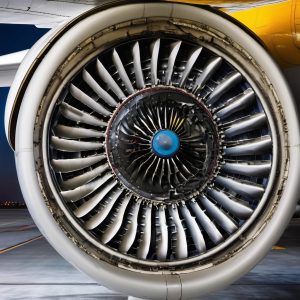The global Aircraft Engine Market encompasses the design, development, manufacturing, and maintenance of engines used in various types of aircraft, including commercial, military, business, and general aviation. Aircraft engines are critical components that determine the performance, efficiency, and environmental impact of aircraft. The market is highly competitive and technologically advanced, with significant investments in research and development to meet the growing demands for fuel efficiency, reduced emissions, and improved performance.
Industry Trends
Sustainability and Environmental Concerns:
Emission Reduction: Stricter environmental regulations are pushing manufacturers to develop engines with lower emissions. Innovations in materials and combustion technologies aim to reduce the carbon footprint of aircraft engines.
Biofuels and Sustainable Aviation Fuels (SAF): There is a growing emphasis on using biofuels and SAF to power aircraft engines, reducing dependency on traditional fossil fuels and lowering greenhouse gas emissions.
Technological Advancements:
Electric and Hybrid Propulsion: The development of electric and hybrid propulsion systems is gaining momentum. These systems promise significant reductions in noise and emissions, contributing to more sustainable aviation.
Advanced Materials: The use of lightweight, high-strength materials such as composites and ceramics is increasing, enhancing engine efficiency and performance while reducing weight.
Download PDF Brochure: https://www.marketsandmarkets.com/pdfdownloadNew.asp?id=14300744
Digitalization and Smart Engines:
Predictive Maintenance: Advanced analytics, IoT, and AI are being used to develop predictive maintenance systems. These systems monitor engine health in real-time, predicting potential failures and optimizing maintenance schedules.
Digital Twins: The use of digital twin technology allows for the virtual simulation of engine performance, enabling more efficient design, testing, and maintenance processes.

Increasing Demand for Fuel Efficiency:
Next-Generation Engines: There is continuous development of next-generation engines that offer better fuel efficiency and lower operating costs. High bypass ratio turbofans and geared turbofan engines are examples of such advancements.
Opportunities
Growing Commercial Aviation Sector:
Passenger Traffic Growth: Increasing global passenger traffic, especially in emerging markets, is driving the demand for new aircraft and, consequently, new aircraft engines.
Fleet Modernization: Airlines are increasingly replacing older, less efficient aircraft with newer models equipped with advanced engines to reduce operational costs and meet environmental standards.
Defense and Military Applications:
Modernization Programs: Military forces worldwide are modernizing their fleets with advanced aircraft engines to enhance operational capabilities. This includes upgrading existing engines and developing new propulsion systems for next-generation military aircraft.
Unmanned Aerial Vehicles (UAVs): The growing use of UAVs in defense applications presents opportunities for engine manufacturers to develop specialized propulsion systems.
Urban Air Mobility (UAM):
Emerging Market: The development of UAM vehicles, such as air taxis and personal air vehicles, is creating a new market for aircraft engines. These vehicles require compact, efficient, and environmentally friendly propulsion systems.
Ask for Sample Report: https://www.marketsandmarkets.com/requestsampleNew.asp?id=14300744
Market Dynamics
Drivers:
Technological Innovations: Continuous advancements in engine technology, materials science, and manufacturing processes drive market growth.
Environmental Regulations: Stringent regulations on emissions and noise pollution push the industry towards more efficient and eco-friendly engine solutions.
Economic Growth: Economic development, particularly in emerging markets, increases air travel demand and aircraft purchases, boosting the aircraft engine market.
Challenges:
High Development Costs: The research, development, and certification of new aircraft engines require significant investment, posing a barrier for new entrants.
Supply Chain Disruptions: Global supply chain issues, such as those caused by geopolitical tensions or pandemics, can impact production and delivery schedules.
Technical Complexity: The complexity of modern aircraft engines necessitates advanced engineering and manufacturing capabilities, making it challenging to achieve high reliability and performance standards.
Partnerships and Collaborations
Joint Ventures and Alliances:
Engine Manufacturers and Airlines: Collaborations between engine manufacturers and airlines for testing and deploying new engines help optimize performance and meet specific operational requirements.
Government and Industry: Public-private partnerships support research and development initiatives, including funding for sustainable aviation projects and technology demonstrators.
Academic and Research Institutions:
Partnerships with universities and research institutions drive innovation through collaborative research on advanced materials, propulsion technologies, and environmental impact mitigation.
Key Companies
General Electric Aviation:
A major player in the aircraft engine market, GE Aviation provides engines for a wide range of commercial and military aircraft. The company focuses on developing advanced technologies to enhance engine performance and efficiency.
Rolls-Royce Holdings:
Known for its high-performance engines, Rolls-Royce serves both the civil and defense sectors. The company is actively involved in developing sustainable aviation technologies, including electric and hybrid propulsion systems.
Pratt & Whitney (a division of Raytheon Technologies):
Pratt & Whitney is renowned for its innovative engine designs, including the Geared Turbofan (GTF) engine, which offers significant improvements in fuel efficiency and noise reduction.
Safran Aircraft Engines:
A key supplier of aircraft engines and components, Safran focuses on developing engines with enhanced performance and lower environmental impact. The company collaborates closely with other industry leaders on various projects.
Honeywell Aerospace:
Honeywell provides engines for a variety of aircraft, including business jets, helicopters, and military aircraft. The company is also investing in technologies for urban air mobility and hybrid-electric propulsion.
MTU Aero Engines:
MTU Aero Engines is involved in the development, manufacturing, and maintenance of commercial and military aircraft engines. The company emphasizes innovation and sustainability in its engine programs.
The global aircraft engine market is dynamic and evolving, driven by technological advancements, environmental considerations, and increasing demand for efficient and reliable propulsion systems. Key companies are focusing on innovation, strategic partnerships, and addressing challenges to capitalize on emerging opportunities. As the aviation industry continues to grow and evolve, aircraft engines will play a critical role in shaping the future of air travel, emphasizing efficiency, sustainability, and performance.
